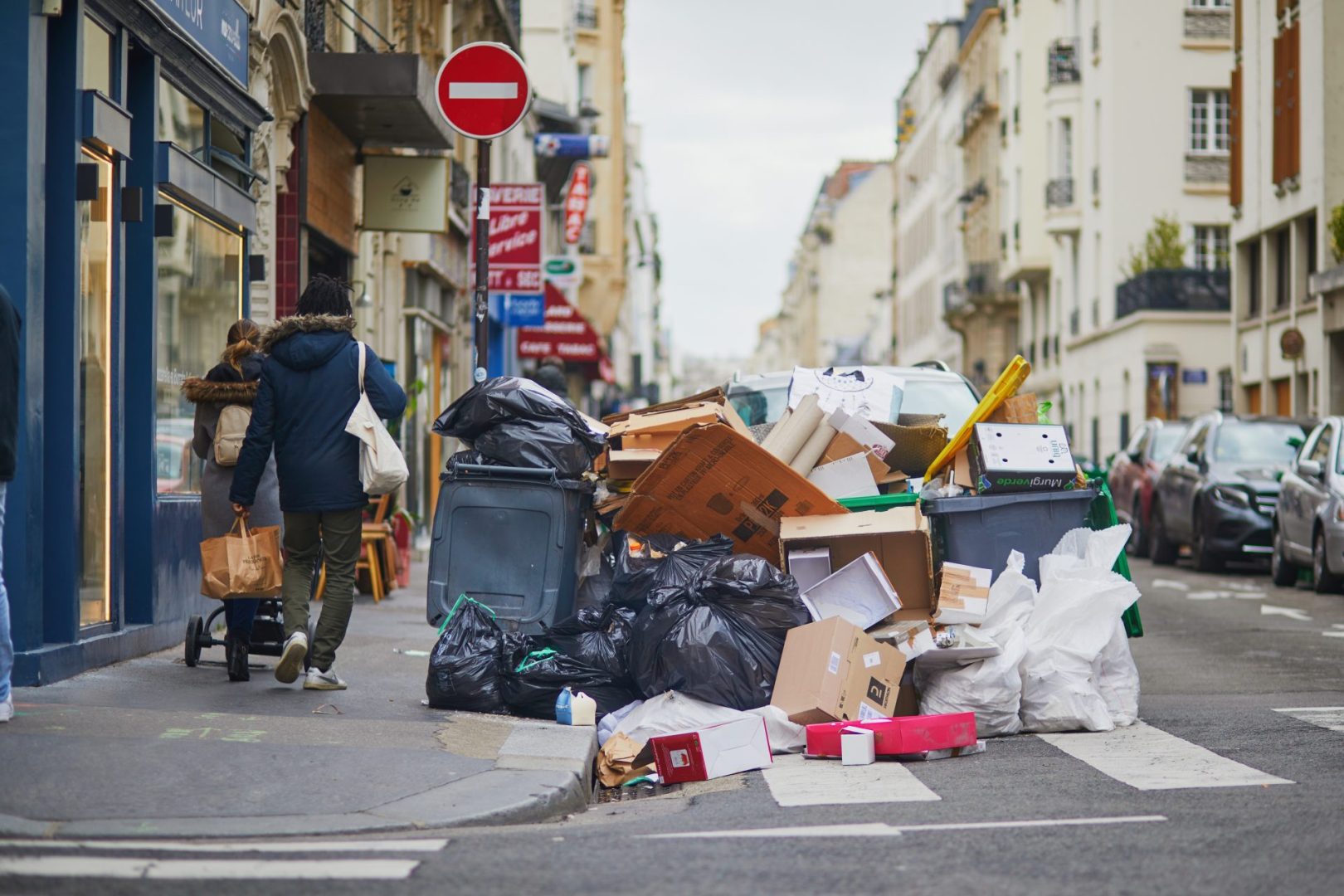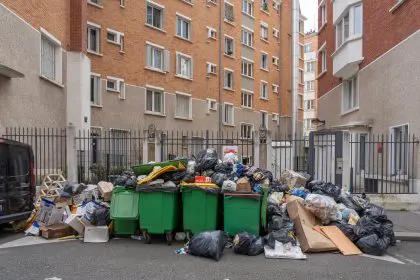Philadelphia’s municipal workers strike has entered its second week with no resolution in sight, as negotiations between the city and its largest public employees union collapsed over the weekend. The ongoing labor dispute has transformed the City of Brotherly Love into a landscape of overflowing trash bins and mounting frustration among residents who are witnessing their neighborhoods deteriorate daily.
AFSCME District Council 33, representing thousands of city workers including police dispatchers and sanitation employees, continues to hold firm in their demands for better wages and healthcare benefits. The union’s members remain on picket lines across the city, creating a standoff that has brought essential municipal services to a grinding halt.
Failed negotiations leave both sides deadlocked
Saturday’s marathon negotiation session between union representatives and Mayor Cherelle Parker’s administration ended without progress, marking the second failed attempt to resolve the dispute. The talks, which lasted several hours, represented the most recent effort to bridge the gap between the city’s offer and the union’s demands.
Previous negotiations held Wednesday into Thursday had stretched nearly 12 hours before collapsing without agreement. The pattern of extended talks followed by impasse has become a frustrating cycle that leaves both city officials and union members wondering when a breakthrough might occur.
The lack of communication regarding future negotiation dates has added uncertainty to an already tense situation. Neither side has announced when they might return to the bargaining table, leaving residents to wonder how long they will endure the consequences of the labor dispute.
Wage dispute centers on competing calculations
The heart of the disagreement lies in how both sides calculate proposed wage increases. City officials have promoted their offer as a historic 13% pay increase spread over four years, while union leadership disputes this characterization of the financial package.
The city’s proposal includes a three-year deal with a 2.75% increase in the first year, followed by 3% raises in each subsequent year. However, the union argues that including a previously agreed-upon 5% salary extension from November 2024 inflates the current offer’s actual value.
Union leaders maintain that the extension was requested by the city, not the workers, and should not be factored into current negotiations. They have indicated their target remains at 5% over three years, while characterizing the city’s current position at 8.75% as insufficient.
Recent attempts at compromise have reportedly included concessions from the union side, though specific details about these modifications remain undisclosed. The union’s willingness to adjust their position suggests ongoing efforts to find common ground, despite the apparent deadlock.
Trash crisis reaches alarming proportions
The most visible impact of the strike has been the rapid accumulation of garbage throughout Philadelphia’s neighborhoods. Residents have coined the term “ParkerPiles” to describe the massive trash mountains appearing on street corners across the city, a reference that has gained traction on social media platforms.
In Northeast Philadelphia’s Mayfair neighborhood, one trash pile grew so large and odorous that city officials were forced to cordon off the area before arranging for cleanup. The mountain of refuse created unbearable conditions for nearby residents who described the stench as overwhelming.
West Philadelphia’s Market Street has become another hotspot for trash accumulation, with residents expressing frustration about the deteriorating conditions in their neighborhood. The sight and smell of decomposing garbage has made daily life increasingly difficult for those living and working in affected areas.
Temporary solutions prove inadequate
City officials established 63 temporary drop-off locations throughout Philadelphia to help residents dispose of their trash during the strike. However, these sites have quickly become overwhelmed, with many locations experiencing severe overcrowding and spillage onto nearby streets and sidewalks.
The drop-off site at Broad Street and Snyder Avenue in South Philadelphia exemplifies the challenge, with trash overflowing from dumpsters and creating unsanitary conditions on surrounding sidewalks. The location has become a gathering point for frustrated residents who must travel blocks from their homes to dispose of garbage.
At 19th and Wylie streets in Francisville, the situation has deteriorated further as residents dump prohibited bulk items including furniture, mattresses, and tires alongside regular household waste. Non-union workers have been deployed to clean these locations, but they struggle to keep pace with the constant influx of garbage.
Health and safety concerns mount
The strike has created serious health and safety implications beyond the inconvenience of overflowing trash. Two sanitation workers were injured in a hit-and-run incident while picketing last week, highlighting the dangers faced by striking employees who maintain their protest presence on city streets.
Rising temperatures forecast for the coming week threaten to exacerbate the sanitation crisis, as decomposing organic waste in summer heat creates ideal conditions for bacterial growth and pest infestations. Public health officials have not yet issued formal warnings, but the combination of heat and accumulated garbage poses obvious risks to community health.
Bus stops and other public gathering places have become particularly problematic as residents use these locations for impromptu trash disposal. The unsanitary conditions at these sites create health hazards for commuters and pedestrians who must navigate around overflowing garbage containers.
Cultural events affected by labor dispute
The strike’s impact extended beyond basic city services to affect Philadelphia’s Fourth of July celebrations. The annual Wawa Welcome America festival proceeded as scheduled, but lost two major headliners who withdrew in solidarity with striking workers.
LL Cool J announced his withdrawal from the Benjamin Parkway event through social media, explaining his refusal to cross picket lines while workers fought for living wages. Philadelphia native Jazmine Sullivan similarly removed herself from the performance lineup, citing her support for the striking municipal employees.
These high-profile cancellations brought national attention to Philadelphia’s labor dispute and demonstrated how the strike’s effects ripple beyond immediate city services to impact the broader cultural and economic life of the community.
Legal battles emerge amid standoff
The city has pursued legal remedies to address the strike’s impact, filing court injunctions aimed at compelling certain essential workers to return to their posts. These legal maneuvers represent the administration’s attempt to restore critical services while negotiations continue.
The union has responded by establishing a strike fund website and rallying support from members and sympathizers. Social media posts from union leadership emphasize solidarity and encourage continued participation in picket line activities while maintaining safety protocols for striking workers.
Community patience wearing thin
Residents across Philadelphia are expressing increasing frustration with both the strike’s duration and its impact on their daily lives. The inability to maintain basic sanitation has created conditions that many describe as chaotic and unbearable.
Neighborhood social media groups have become forums for residents to share information about trash disposal alternatives and express their growing impatience with the situation. Many residents report being forced to travel significant distances to dispose of garbage, adding inconvenience to already challenging circumstances.
The strike has also highlighted disparities in how different neighborhoods experience the crisis, with some areas seeing more effective temporary solutions while others struggle with completely overwhelmed systems.
Path forward remains unclear
As the strike enters its second week, both sides face mounting pressure to reach a resolution. The visible deterioration of city conditions creates political pressure on the Parker administration while potentially building public support for workers’ demands for better compensation.
The union’s establishment of a strike fund suggests preparation for an extended labor action, while the city’s legal challenges indicate a willingness to pursue alternative strategies beyond negotiation. These parallel approaches may signal either escalation or eventual compromise as both sides test their respective leverage in the dispute.
Philadelphia residents continue to bear the immediate consequences of the standoff, hoping that renewed negotiations will soon restore essential services and return their city to normal operations.













